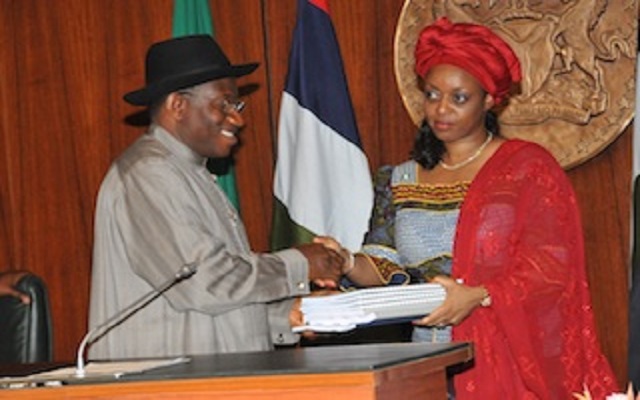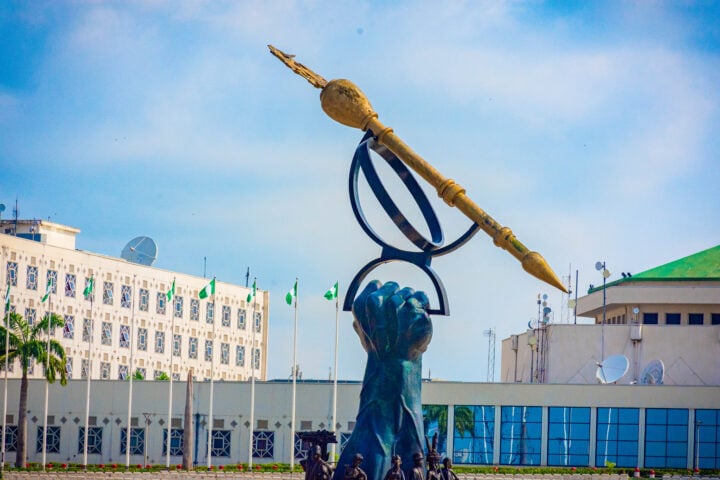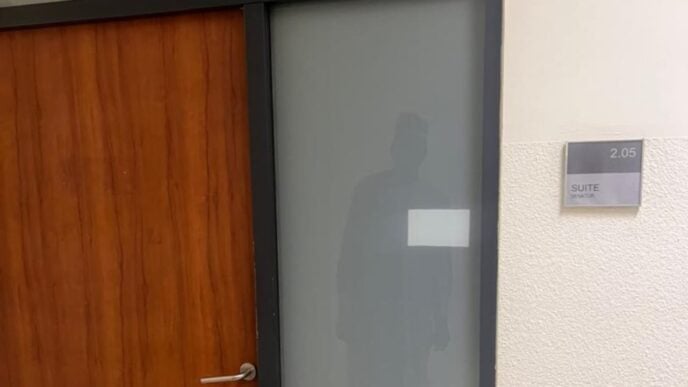Alison-Madueke submitting the subsidy probe report to Jonathan in 2012
On Monday, Femi Otedola, the billionaire businessman, alleged that under President Goodluck Jonathan, over N2 trillion was siphoned through questionable petrol subsidy claims linked to depot licences.
He was commenting on the face-between Dangote Refinery and the Depot and Petroleum Products Marketers Association of Nigeria (DAPPMAN).
Otedola asked DAPPMAN to evolve a new business model as depots are going out of fashion and nobody was going to pay them subsidy for product storage and bridging any more.
This has brought back memories of the “fuel subsidy scam” that ruled the airwaves in 2012 following an attempt by Jonathan to deregulate the downstream sector.
Advertisement
It was argued by activists then that the government should first clean the rot in the subsidy scheme before attempting to deregulate the sector.
Protesters organised the “Occupy Ojota” rally against the hike in petrol price from N65/litre to N141 on January 1, 2012.
In response to the protests — which were spreading to other parts of the country — Jonathan reduced the price to N97.
Advertisement
On January 12, 2012, Jonathan directed the Economic and Financial Crimes Commission (EFCC) to probe subsidy payments to marketers, who were accused of colluding with government officials to commit the scam.
Some were accused of getting payments despite not importing any product.
There were also accusations of over-invoicing, round-tripping and falsification of import documents.
Months later, a report by the house of representatives ad-hoc committee showed that between 2009 and 2011, mismanagement and theft by marketers and government officials cost Nigeria $6.8 billion.
Advertisement
According to a Reuters report, the investigators found that importers were being paid for 59 million litres a day, while the country only consumed 35 million.
The report also revealed that Diezani Alison-Madueke, former oil minister, had a conflict of interest by being both on the board of the Nigerian National Petroleum Company (NNPC), a fuel importer, and the supervisor of the subsidy regulator, the defunct Petroleum Products Pricing and Regulatory Agency (PPPRA).
But beyond the panel’s findings, did the revelations expose deeper rot within the system, implicating both influential figures and minor actors?
Some of the biggest beneficiaries of subsidy payments later went on to acquire upstream assets, majority shares in big banks and fleets of private jets.
Advertisement
WERE THE BIG GUYS LET OFF?
The EFCC commenced its investigation, indicting several actors and companies, eventually jailing accused parties.
Advertisement
In July 2012, the EFCC concluded arrangements to prosecute the first batch of 18 suspects implicated in the oil subsidy fraud.
The suspects, comprising six oil companies and 11 individuals, were arraigned before courts in Lagos.
Advertisement
Over 140 individuals and organisations, according to the anti-graft agency, were implicated in the investigations into the subsidy payments.
In May, a special offences court in Ikeja, Lagos state, convicted and sentenced Mamman Ali, son of Ahmadu Ali, former chairman of Peoples Democratic Party (PDP), to 14 years imprisonment over N2.2 billion oil subsidy fraud.
Advertisement
Christian Taylor, an oil marketer, was sentenced alongside Ali to 14 years imprisonment.
In January 2017, a high court in Lagos sentenced Ada Ugo-Ngadi, managing director of Ontario Oil and Gas Limited and Walter Wagbatsoma, the company’s chairman, to 10 years imprisonment, for defrauding the federal government of N754 million in oil subsidy claims.
In March 2017, a high court in Ikeja also secured the conviction of Rowaye Jubril, managing director, Brila Energy Limited.
However, while several “small actors” were jailed, the pressing question remains: why were the major players spared?
TheCable understands that officials of the Jonathan administration stalled the EFCC probe because it indicted many people in its good books.
In July 2021, Ngozi Okonjo-Iweala, director-general of the World Trade Organisation (WTO), said her life was threatened for saving Nigeria huge sums of money from oil subsidy scam while serving as the country’s finance minister.









